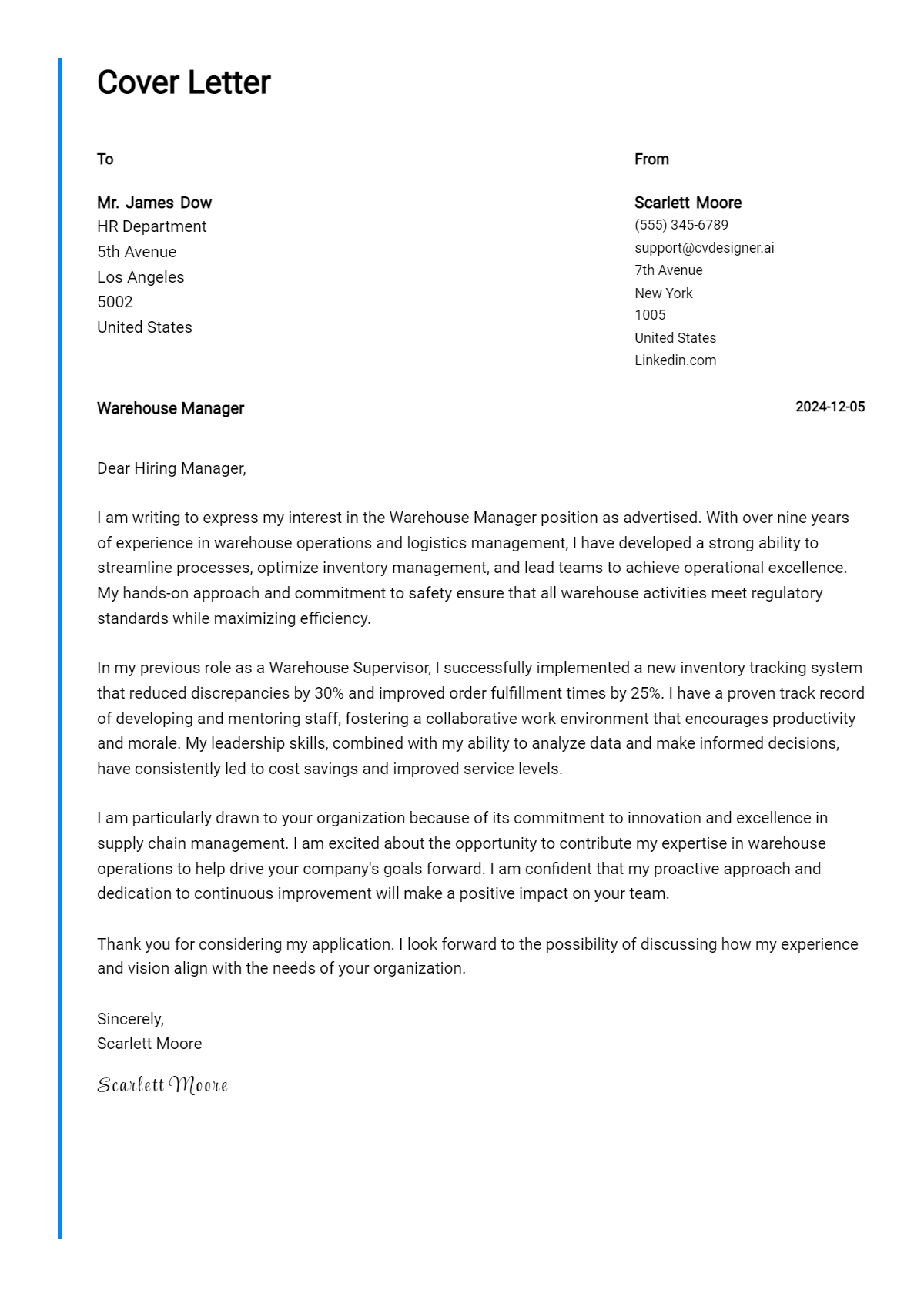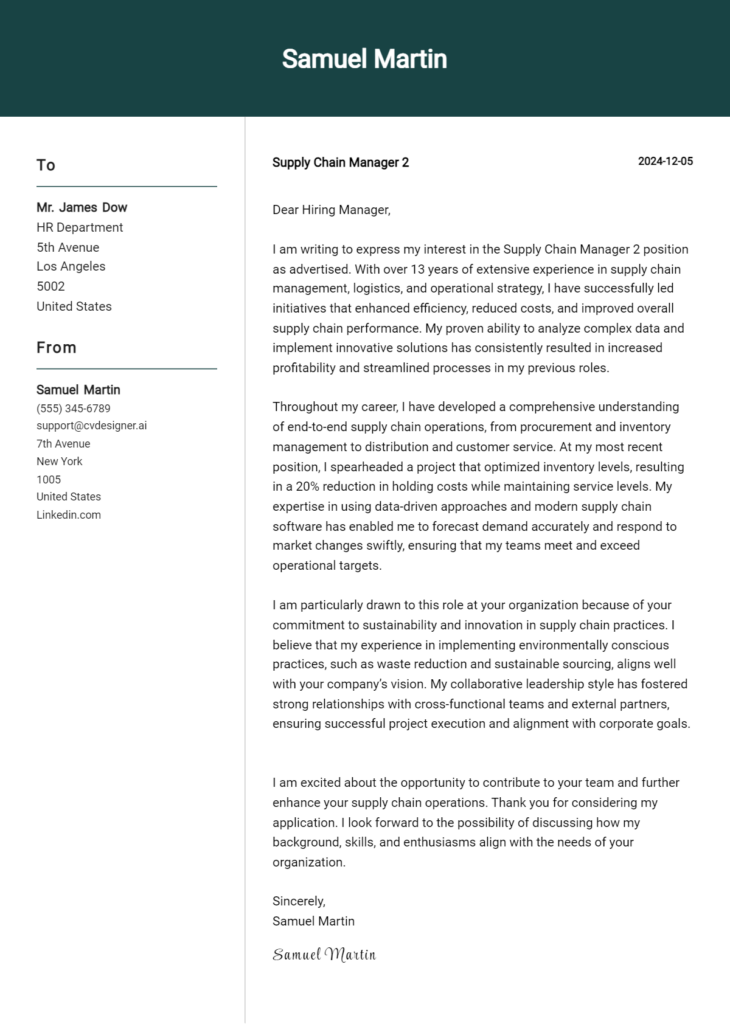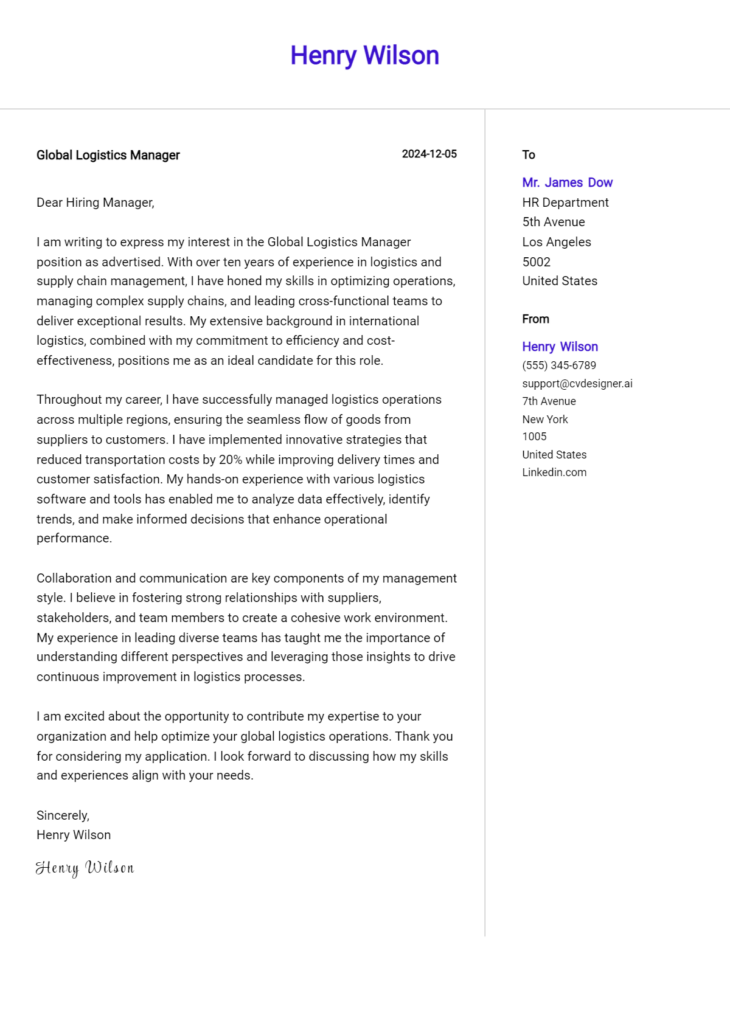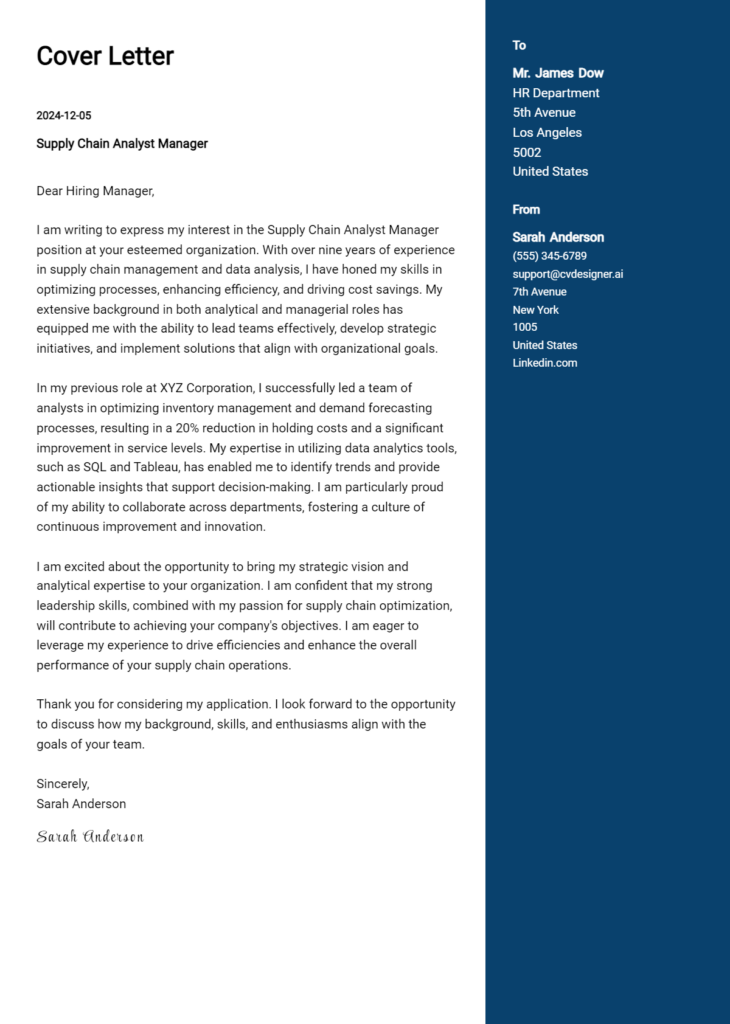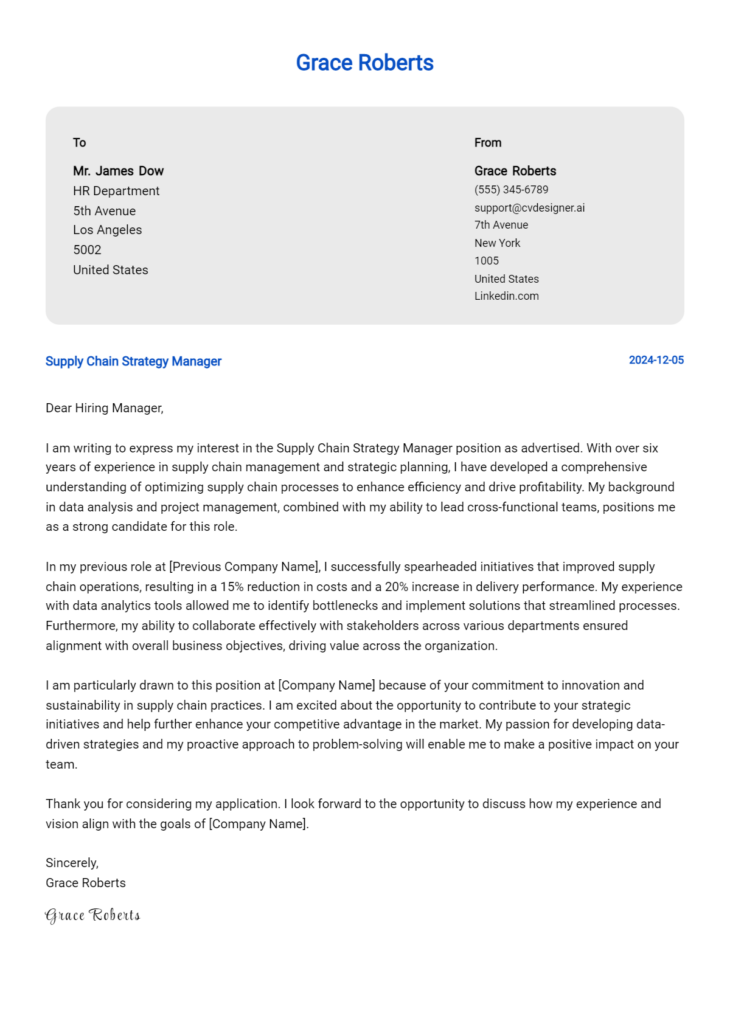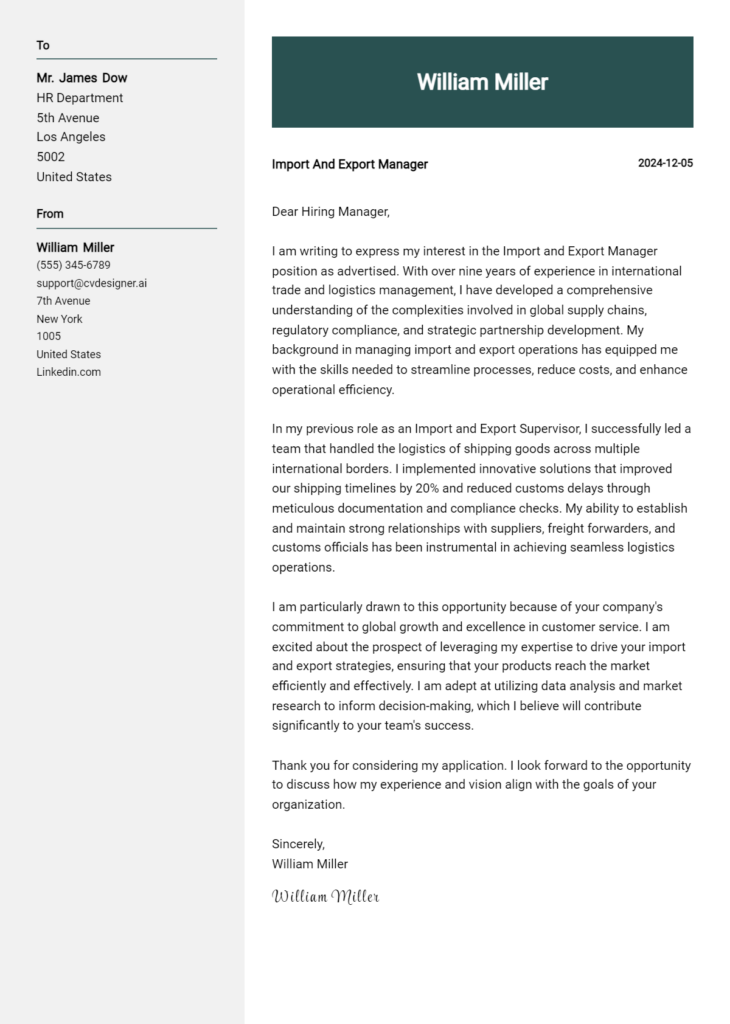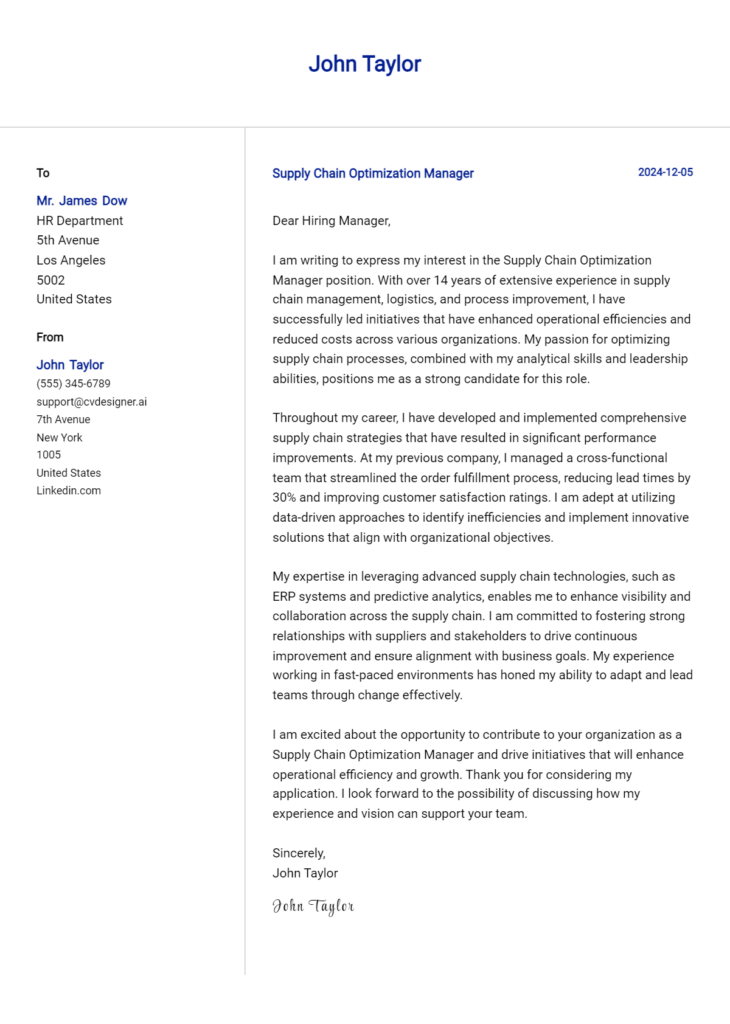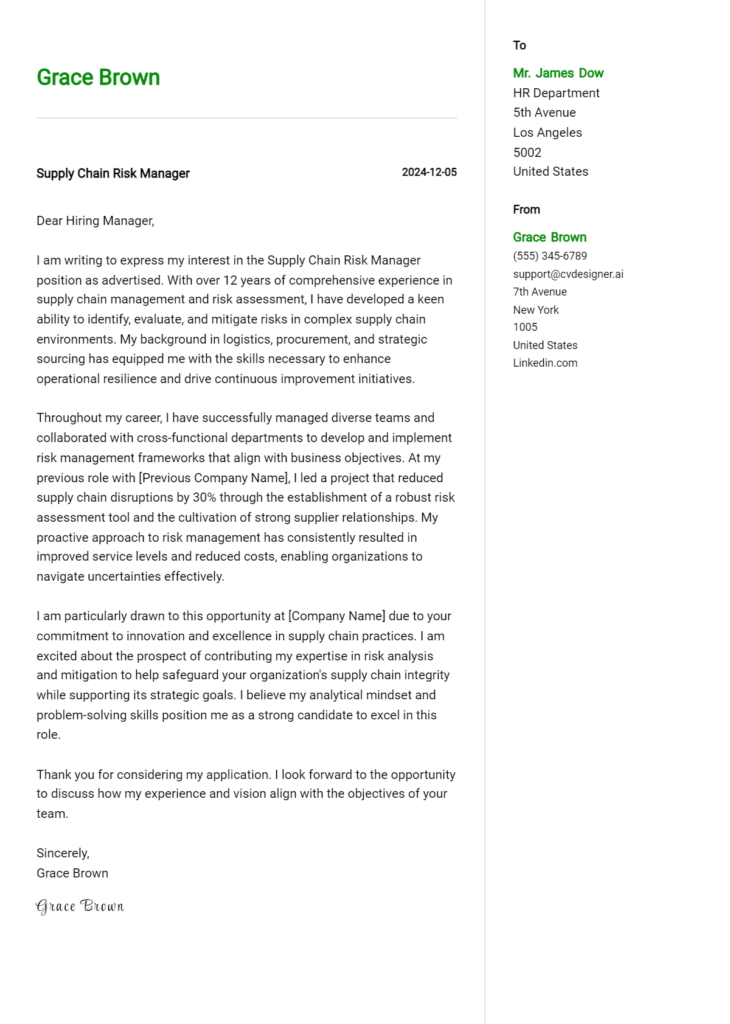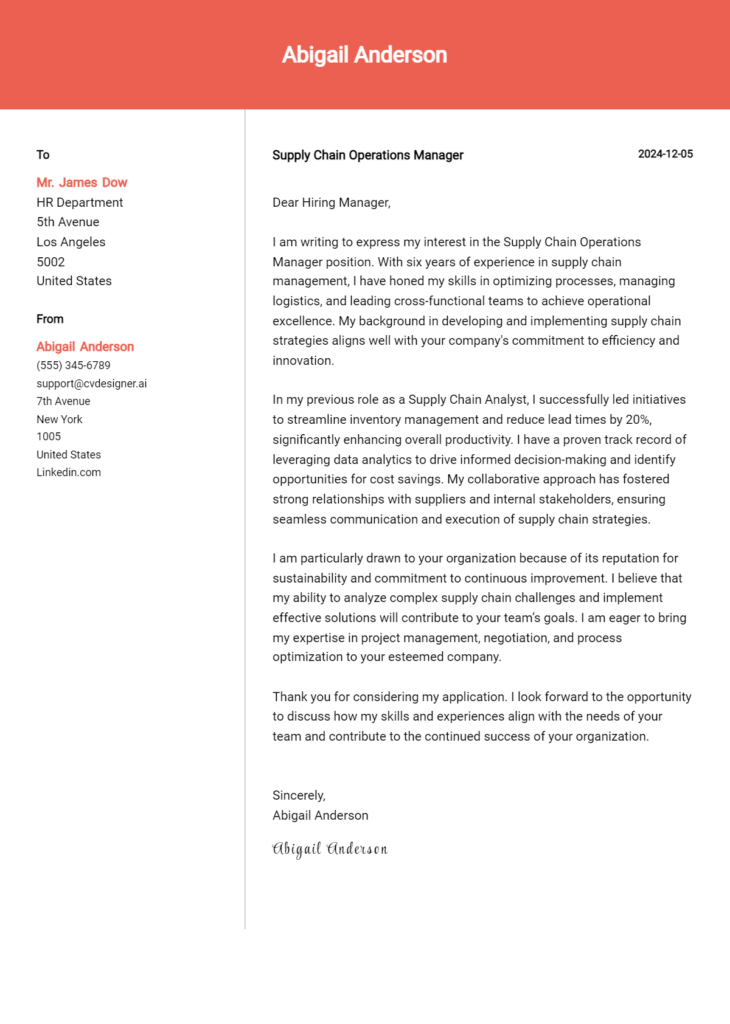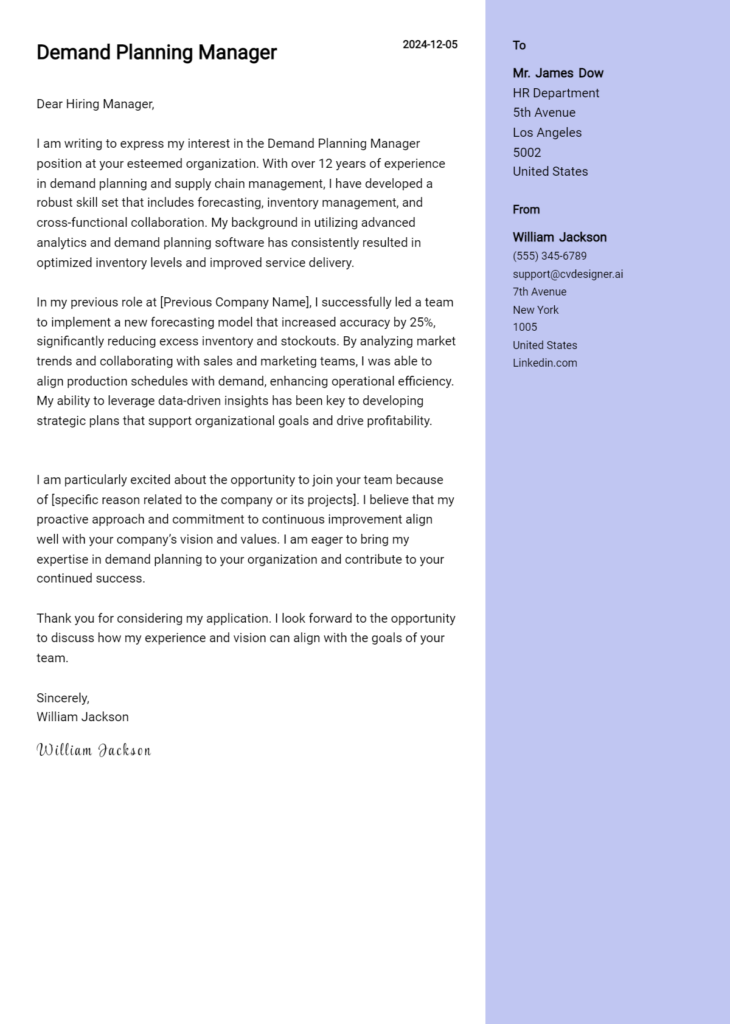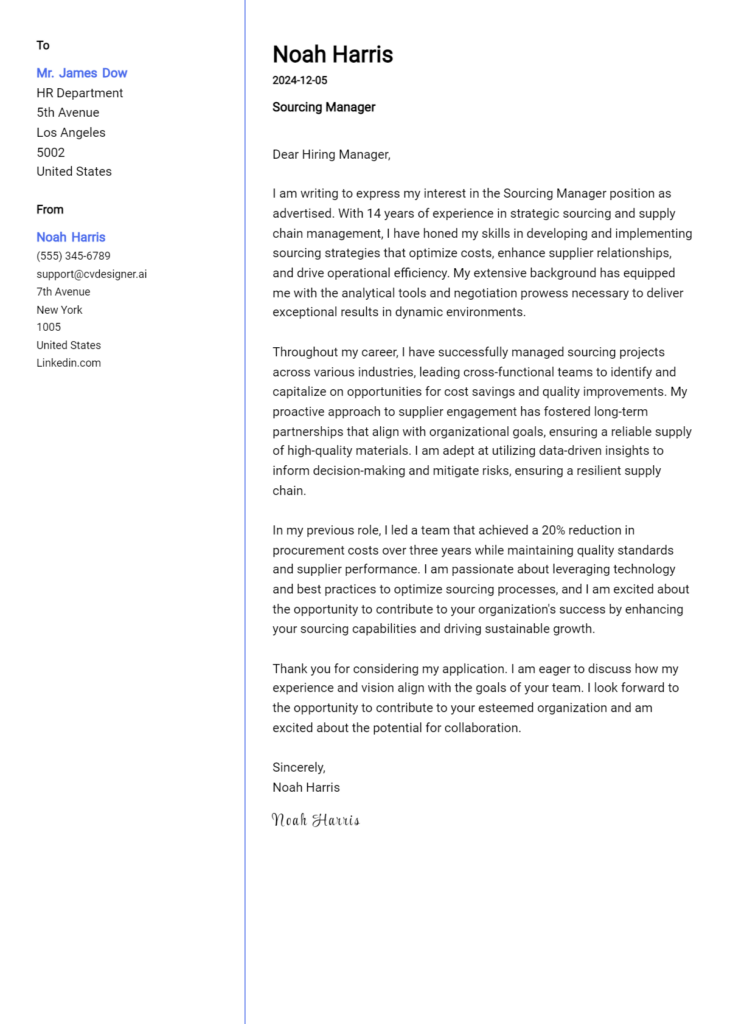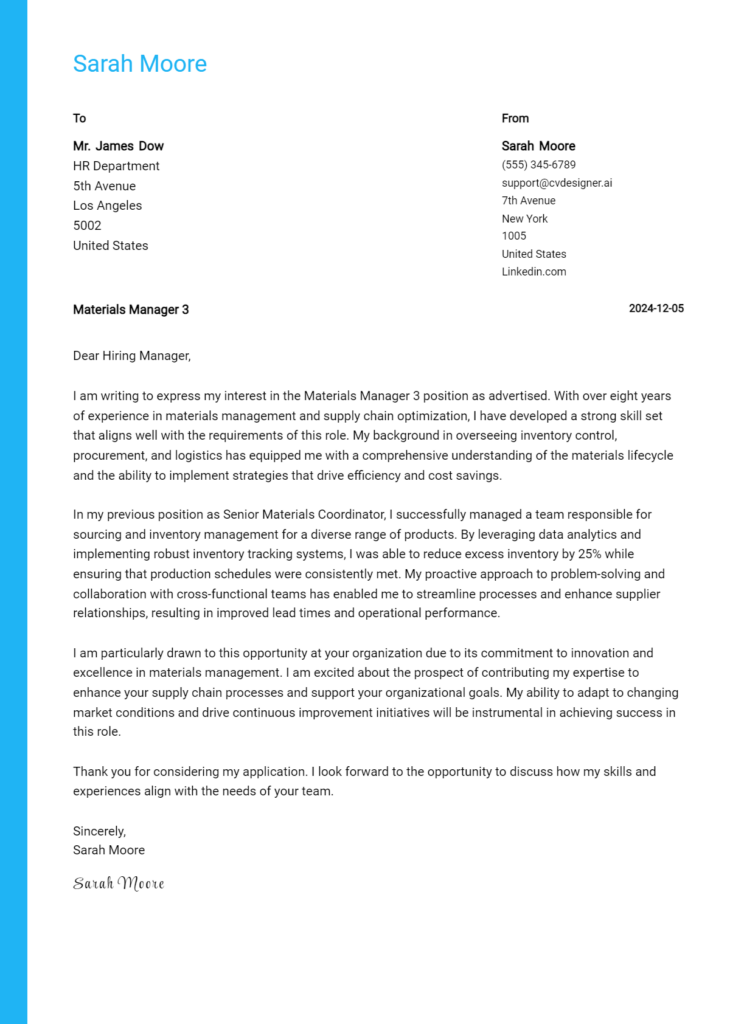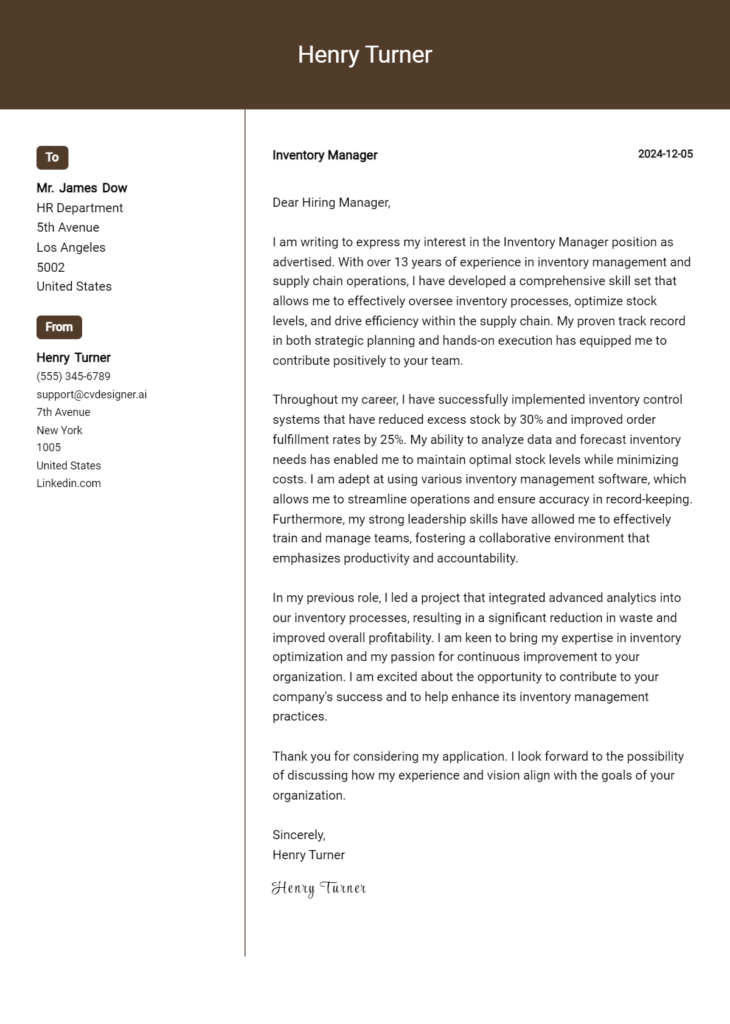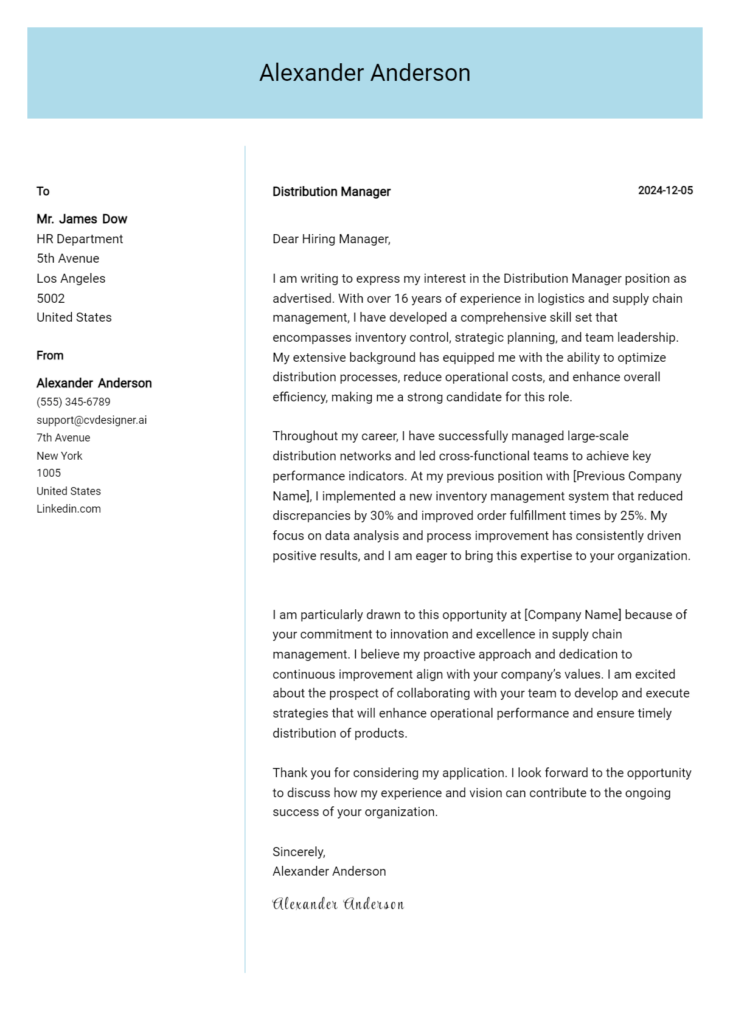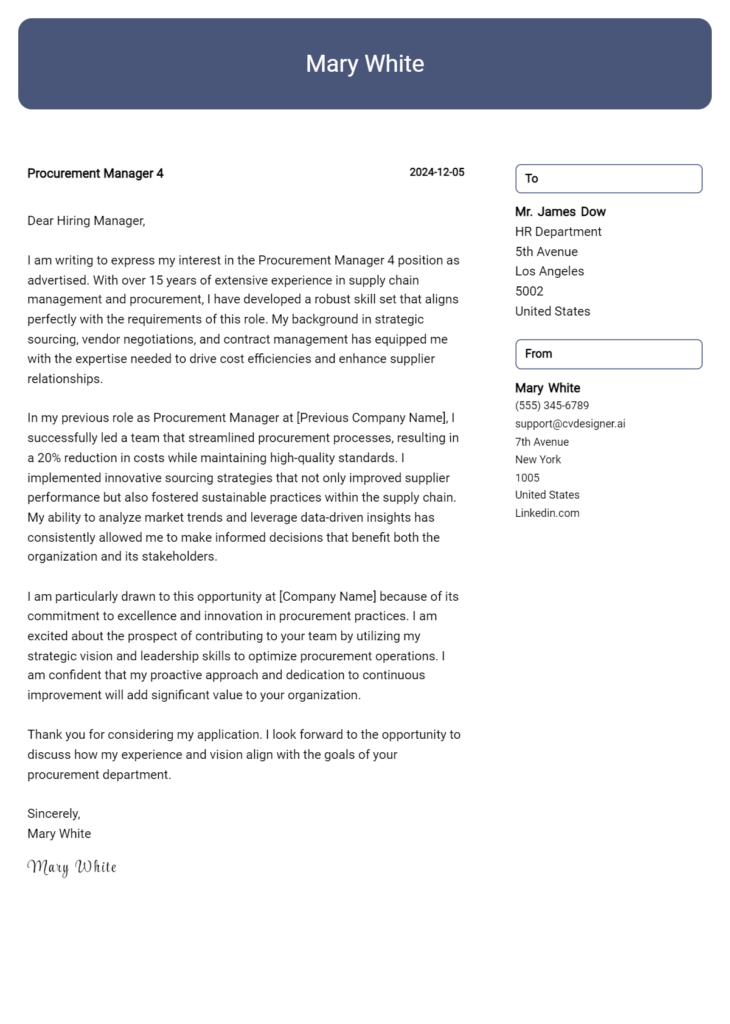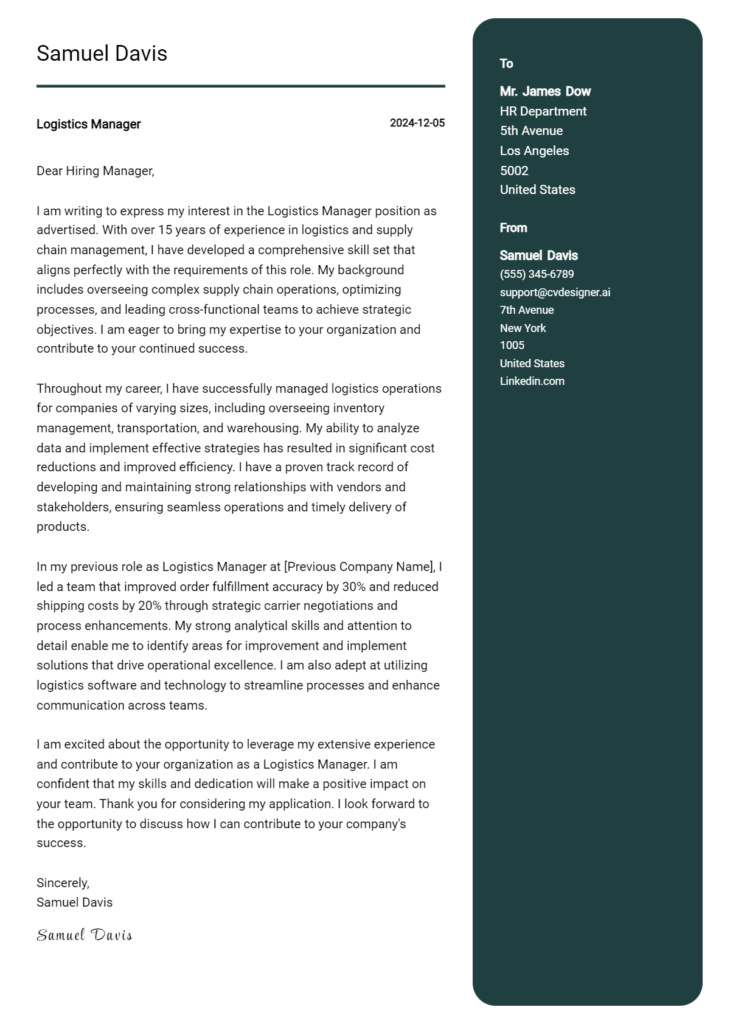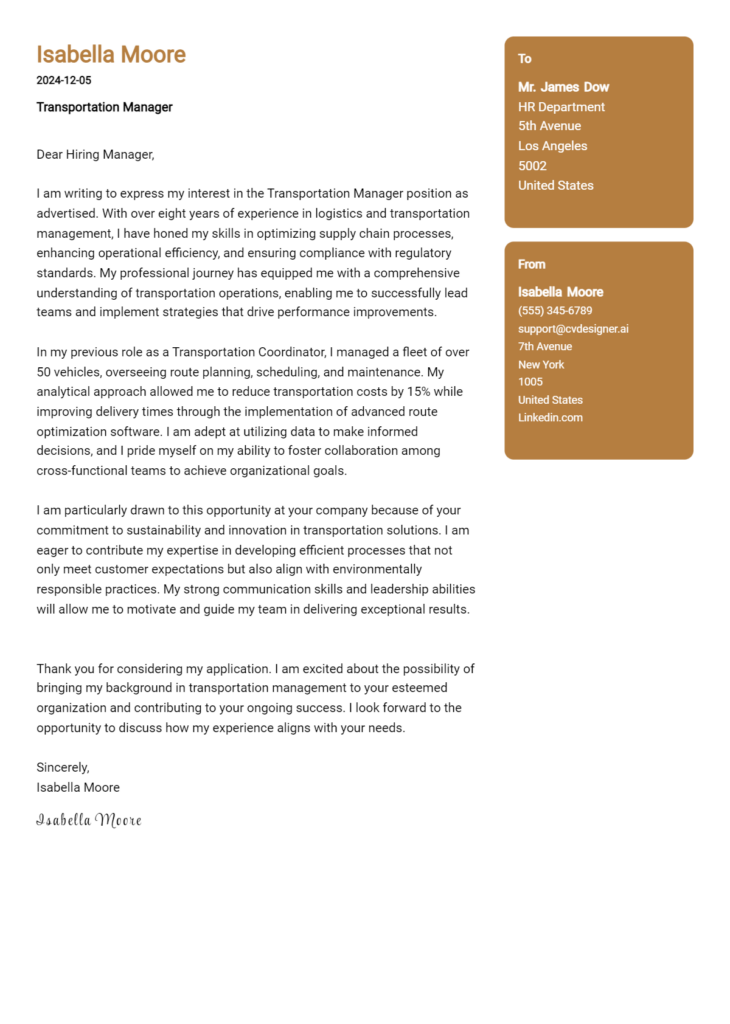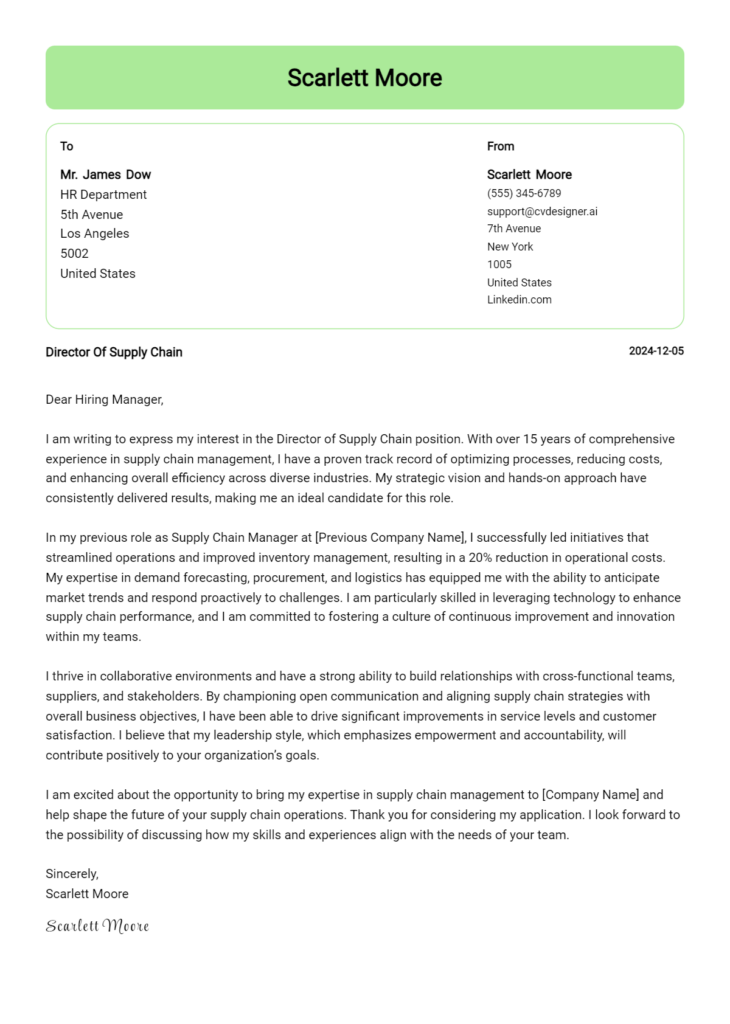Warehouse Manager Cover Letter Examples
Explore additional Warehouse Manager cover letter samples and guides and see what works for your level of experience or role.
How to Format a Warehouse Manager Cover Letter?
Crafting a well-structured cover letter is essential for a Warehouse Manager as it not only showcases your qualifications but also demonstrates your organizational skills and ability to manage logistics efficiently. Just as a warehouse relies on effective systems and processes, your cover letter should follow a clear format to capture the hiring manager's attention. A meticulously formatted cover letter reflects your attention to detail and operational proficiency—key attributes in the warehouse management field.
In this guide, we'll outline how to structure your cover letter, providing insights and industry-specific examples to help you create a persuasive document.
We'll focus on the essential components of a professional cover letter, including:
- Cover Letter Header
- Cover Letter Greeting
- Cover Letter Introduction
- Cover Letter Body
- Cover Letter Closing
Each section is crucial in highlighting your qualifications and professionalism. Let’s break down each part and explain how to make your Warehouse Manager cover letter stand out.
Importance of the Cover Letter Header for a Warehouse Manager
The cover letter header is a crucial component when applying for the role of a Warehouse Manager, as it sets the tone for your application and provides essential information at a glance. A well-structured header should include your contact information, the date of writing, and the recipient's details, such as their name, title, and company. Clarity and professionalism are vital, as they reflect your organizational skills and attention to detail—qualities that are critical in warehouse management. A strong header can make a positive first impression, while a weak one may raise doubts about your suitability for the position.
Strong Example:
John Doe 123 Warehouse Lane Cityville, ST 12345 (123) 456-7890 johndoe@email.com October 15, 2023 Jane Smith Hiring Manager ABC Logistics 456 Distribution Ave Cityville, ST 12345
Weak Example:
john d. 123 W. Ln 10/15/23 jane ABC Co.
The Importance of the Cover Letter Greeting
The greeting of a cover letter is more than just a formality; it sets the tone for the entire document and establishes a level of professionalism that can leave a lasting impression on the hiring manager. A well-crafted greeting demonstrates your attention to detail and ability to personalize your application, making it clear that you are genuinely interested in the position. By addressing the hiring manager directly, you create a connection that can engage the reader and encourage them to continue reading. To make your greeting stand out, avoid generic phrases like "To Whom It May Concern" or "Dear Sir/Madam." Instead, take the time to research the name of the recipient, which can often be found on the company’s website or LinkedIn. This small effort can significantly enhance the impact of your cover letter.
Strong Greeting Example for Warehouse Manager
Dear Mr. Smith,
Weak Greeting Example for Warehouse Manager
To Whom It May Concern,
The Importance of a Compelling Cover Letter Introduction for a Warehouse Manager
A well-crafted cover letter introduction for a Warehouse Manager is crucial in making a strong first impression on the hiring manager. This introduction should not only capture their attention but also convey the candidate's genuine interest in the role. Additionally, it should showcase key skills or achievements that align with the job description, setting the stage for the rest of the letter. A strong introduction can differentiate a candidate in a competitive job market, while a weak one may lead to missed opportunities.
Strong Example
Dear [Hiring Manager's Name], As an accomplished Warehouse Manager with over 7 years of experience optimizing logistics and inventory management, I am excited to apply for the Warehouse Manager position at [Company Name]. My proven track record in enhancing operational efficiency and reducing costs aligns seamlessly with your company's commitment to excellence. I am eager to contribute my expertise in streamlining warehouse processes and leading teams to achieve exceptional results.
Weak Example
Hi, I am writing to apply for the Warehouse Manager job. I have worked in warehouses before and have some experience. I think I would be good at this job because I am organized and can lift heavy things.
Purpose of the Cover Letter Body for a Warehouse Manager
The body of a cover letter for a Warehouse Manager serves as a critical platform for candidates to articulate their relevant skills, experiences, and the unique value they bring to a potential employer. This section allows candidates to highlight specific projects they have successfully managed, such as optimizing inventory processes or implementing safety protocols that resulted in reduced accidents and improved efficiency. By detailing accomplishments like leading a team through a major warehouse relocation or achieving significant cost savings through process improvements, candidates can demonstrate their ability to drive results and contribute positively to the organization.
Strong Example
Dear Hiring Manager, I am excited to apply for the Warehouse Manager position at XYZ Company. In my previous role at ABC Logistics, I successfully led a team of 20 employees in a project that streamlined our inventory management system, resulting in a 30% reduction in order processing time. Additionally, I implemented a new safety training program that decreased workplace accidents by 40% within one year. I am confident that my experience in optimizing warehouse operations and managing diverse teams will bring valuable insights and efficiency improvements to your organization. Sincerely, John Doe
Weak Example
Dear Hiring Manager, I am interested in the Warehouse Manager job at your company. I have worked in warehouses for several years and have done various tasks. I think I can help your company. I am a hard worker and always try to do my best. Best, Jane Smith
Importance of the Cover Letter Closing for a Warehouse Manager
The closing paragraph of a cover letter is crucial as it leaves a lasting impression on the hiring manager. For a Warehouse Manager position, it’s important to summarize your relevant qualifications, reiterate your enthusiasm for the role, and encourage the next steps, such as reviewing your resume or scheduling an interview. A strong closing reinforces your suitability for the role, while a weak closing may leave the reader uncertain about your intentions or qualifications.
Strong Example
Thank you for considering my application for the Warehouse Manager position at ABC Logistics. With over seven years of experience in inventory management and team leadership, I am excited about the opportunity to bring my skills to your esteemed company. I am particularly drawn to ABC Logistics because of its commitment to operational excellence and innovation. I look forward to the possibility of discussing how my background and vision align with your needs. Please feel free to review my resume for more details, and I hope to schedule an interview to further discuss my candidacy.
Weak Example
Thanks for reading my letter. I think I would be a good fit for the Warehouse Manager job. Let me know if you want to talk more. I guess you can look at my resume too.
These tips will assist candidates in crafting an effective cover letter for a Warehouse Manager position. A strong cover letter is crucial for showcasing your technical skills, problem-solving abilities, knowledge of the Software Development Life Cycle (SDLC), teamwork experiences, and a passion for continuous learning in the warehousing and logistics sector. By highlighting these elements, you can make a compelling case for your candidacy.
Tips for Crafting a Warehouse Manager Cover Letter
Highlight Technical Skills: Clearly outline your technical competencies related to warehouse management systems (WMS), inventory management software, and automation tools. Mention any specific systems you are proficient in and how they contributed to efficiency in your previous roles. This demonstrates your ability to leverage technology in managing warehouse operations.
Showcase Problem-Solving Abilities: Provide examples of challenges you faced in previous positions and the strategies you employed to overcome them. Whether it's optimizing inventory turnover or resolving logistical issues, showcasing your analytical skills and ability to think on your feet will set you apart as a candidate who can maintain operations seamlessly.
Demonstrate Knowledge of SDLC: If applicable, reference your understanding of the Software Development Life Cycle and how it relates to managing warehouse operations. Discuss your experience in collaborating with IT teams to implement software solutions that enhance warehouse productivity and streamline processes.
Emphasize Teamwork and Leadership: As a Warehouse Manager, leading a team effectively is crucial. Highlight experiences where you successfully managed teams, facilitated training, or improved morale. This not only showcases your leadership skills but also your ability to foster a collaborative work environment that drives results.
Convey a Passion for Continuous Learning: In an ever-evolving industry, a commitment to professional development is essential. Mention any relevant certifications, training programs, or workshops you’ve completed, and express your enthusiasm for staying updated with industry trends and best practices. This shows employers that you are not only qualified but also eager to grow and adapt.
By following these tips and utilizing resources like cover letter templates and a cover letter builder, you can create a compelling cover letter that effectively communicates your qualifications and passion for the Warehouse Manager role.
Common Mistakes to Avoid in a Warehouse Manager Cover Letter
Avoiding common mistakes in a cover letter is crucial for standing out in the competitive field of warehouse management. A well-crafted cover letter can make a significant difference in securing an interview, while errors can undermine your professionalism. Here are some common pitfalls to watch out for:
Generic Greetings: Using "To Whom It May Concern" can make your letter seem impersonal. Instead, try to find the hiring manager's name for a more tailored approach.
Rehashing Your Resume: Simply reiterating what’s on your resume is a missed opportunity. Use your cover letter to highlight specific achievements and skills relevant to warehouse management.
Lack of Specificity: Avoid vague statements about your experience. Instead, quantify your accomplishments with specific metrics, like "increased efficiency by 20% through process improvements."
Neglecting Formatting: A cluttered or inconsistent format can distract from your message. Ensure you follow a professional cover letter format that is easy to read.
Spelling and Grammar Errors: Typos can severely damage your credibility. Always proofread your letter or consider using tools to catch mistakes before submission.
Failing to Convey Passion: A lack of enthusiasm can make you seem disinterested. Express your passion for warehouse management and the specific company in your letter.
Ignoring the Job Description: Failing to align your skills with the specific requirements listed in the job description can be a missed opportunity. Tailor your cover letter to reflect how you meet those needs.
For further guidance, explore cover letter examples that illustrate effective writing techniques.
Cover Letter FAQs for Warehouse Manager
What should I include in my cover letter as a Warehouse Manager?
In your cover letter, you should highlight your relevant experience, skills, and accomplishments that align with the warehouse manager role. Start with a strong introduction that captures the hiring manager's attention. Mention your years of experience in warehouse operations, focusing on areas such as inventory management, logistics, and team leadership. Include specific achievements, such as improving efficiency or reducing costs. Don't forget to discuss your familiarity with safety regulations and technology used in warehouse management, such as inventory tracking systems. Finally, express your enthusiasm for the position and how your skills can contribute to the company's success.
How can I demonstrate my leadership skills in my cover letter?
To effectively demonstrate your leadership skills, provide specific examples of how you've successfully managed teams in previous roles. Describe situations where you implemented processes that improved productivity or morale among staff. Highlight your experience in training new employees and fostering a collaborative work environment. Mention any initiatives you led that resulted in enhanced safety protocols or operational efficiencies. Use quantifiable metrics when possible, such as percentage increases in productivity or reductions in errors, to illustrate your impact as a leader. This will help convey your ability to motivate and guide a team in achieving organizational goals.
Should I customize my cover letter for each job application?
Absolutely! Customizing your cover letter for each job application is crucial for making a strong impression. Tailor your content to align with the specific requirements and responsibilities outlined in the job description. Use keywords from the job posting to demonstrate that you understand the role and are a suitable candidate. Discuss how your background and skills specifically meet the needs of the organization. Customization shows that you are genuinely interested in the position and have taken the time to understand the company’s values and goals. This increases your chances of standing out among other applicants.
How long should my cover letter be?
Your cover letter should be concise, typically one page in length, with 3 to 4 well-structured paragraphs. Aim for a word count between 250 to 400 words. Begin with an engaging introduction, followed by a body that details your relevant experiences and skills. Use bullet points if necessary to make information easier to read. Conclude with a strong closing statement that reiterates your interest in the position and invites further discussion. Remember, hiring managers appreciate brevity and clarity, so focus on presenting your qualifications effectively without overwhelming them with excessive detail.
Build your Cover Letter in minutes
Use an AI-powered cover letter builder and have your letter done in 5 minutes. Just select your template and our software will guide you through the process.

